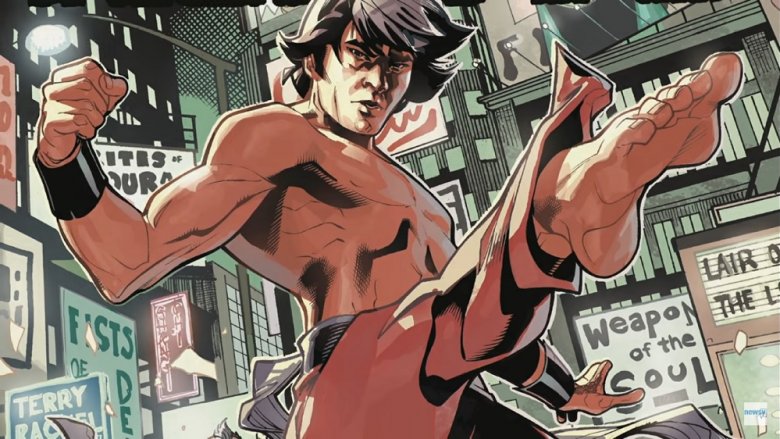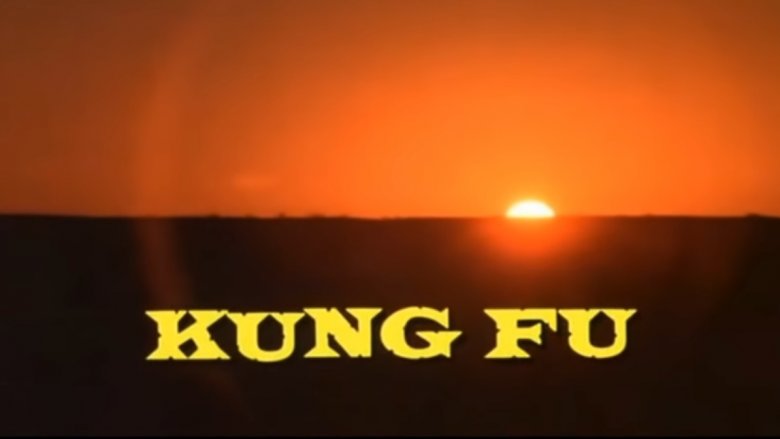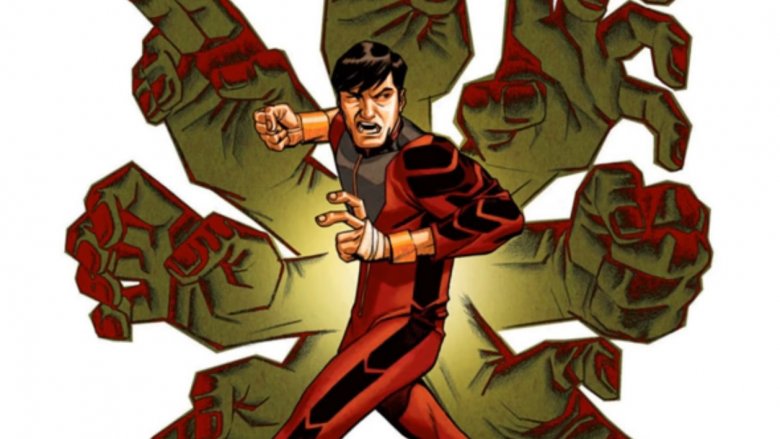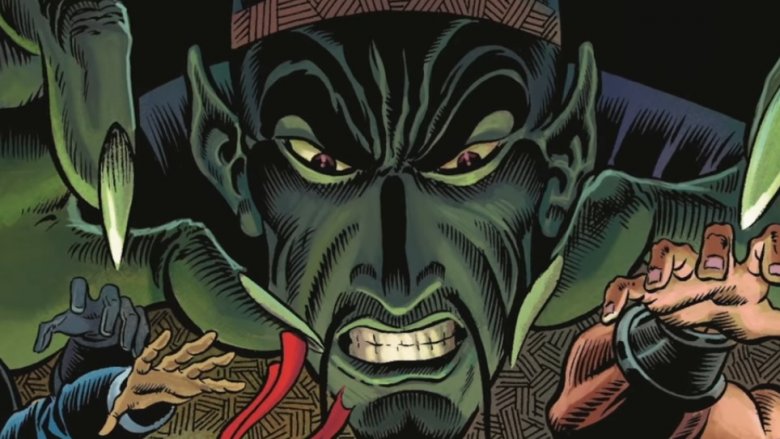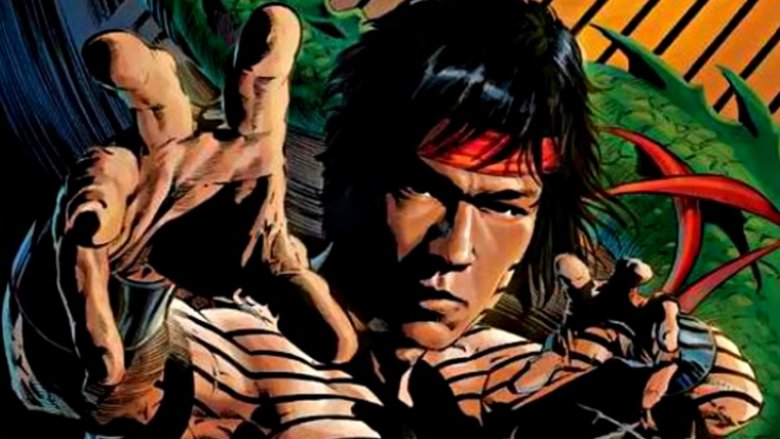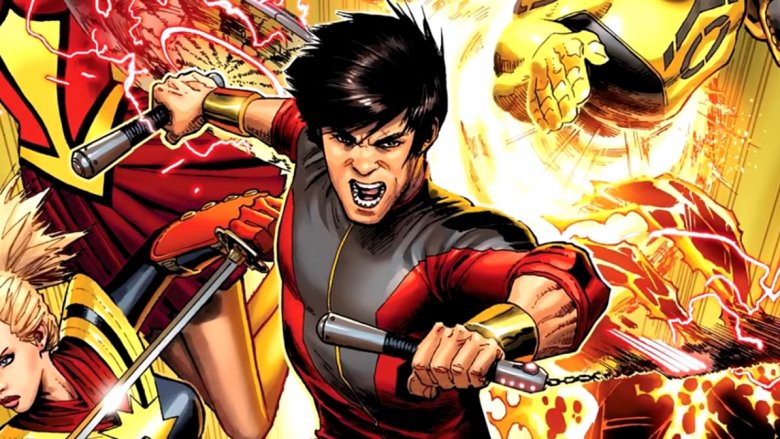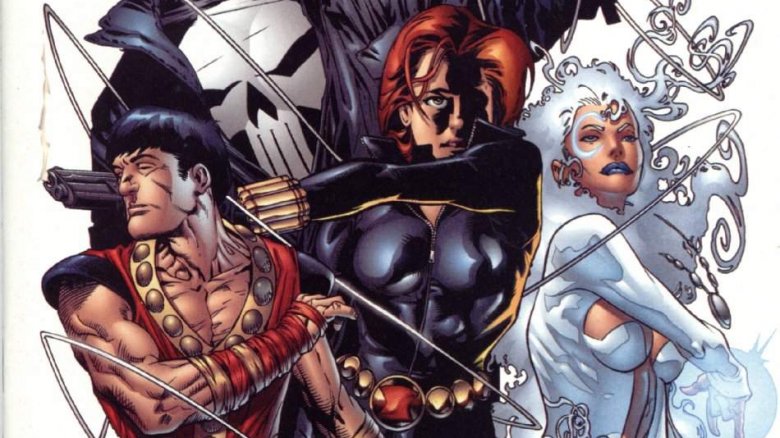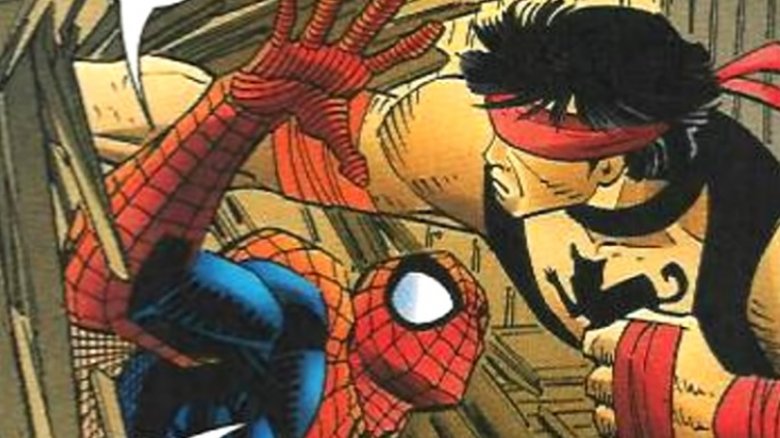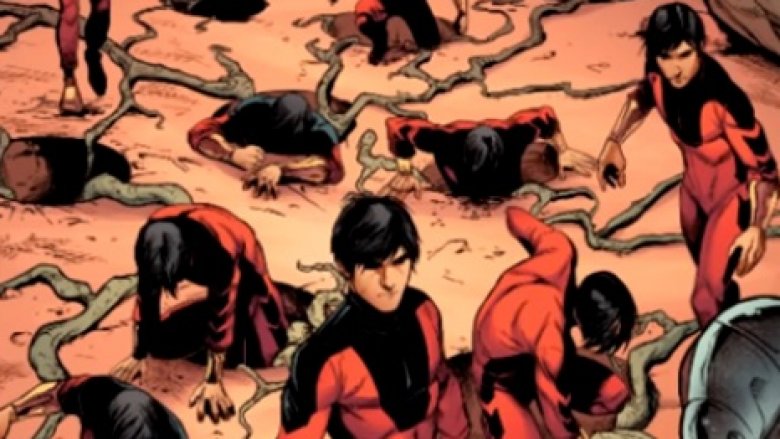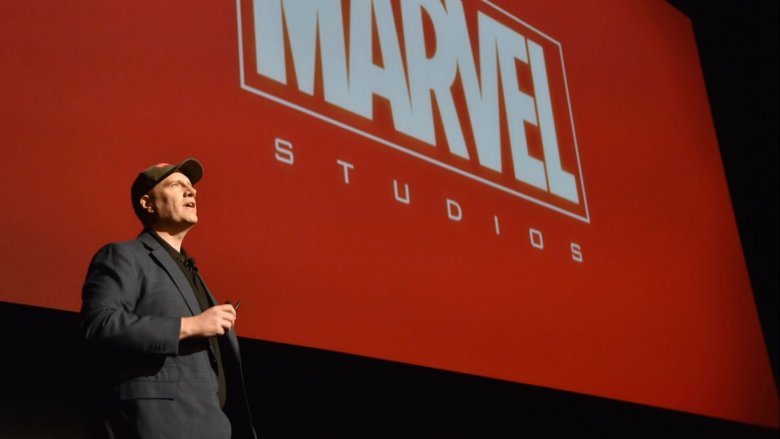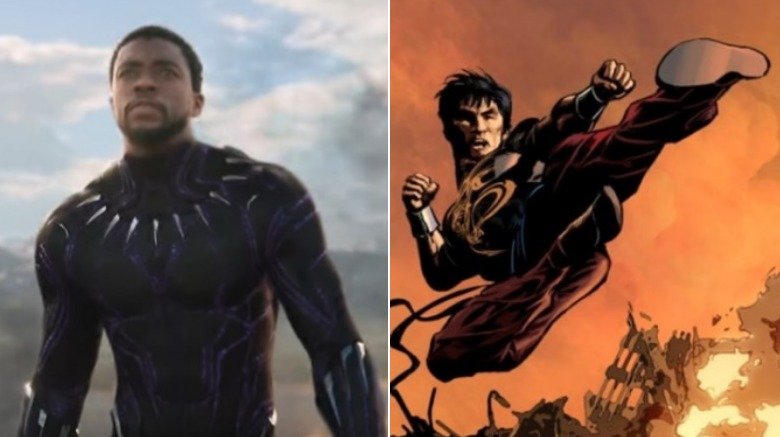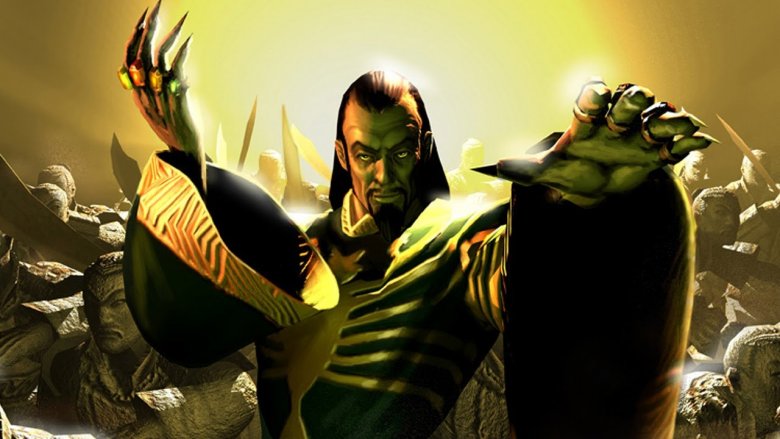The Untold Truth Of Shang-Chi
Phase 4 of the Marvel Cinematic Universe is almost upon us, and is it ever going to be a wild ride. Announced at San Diego Comic-Con 2019, Mighty Marvel's theatrical slate for the next couple of years offers an embarrassment of riches. There's the long-overdue solo vehicle for everyone's favorite Russian superspy, Black Widow; a film centered on an ancient race of near-immortal beings which were created by the legendary Jack Kirby, The Eternals; a sojourn through craziness with Mister Doctor and Scarlet Witch, Doctor Strange in the Multiverse of Madness; and an unprecedented fourth solo outing for an original Avenger, Thor: Love and Thunder.
As awesome as these promise to be, one additional title perked up the ears of a strong contingent of Marvel fans: Shang-Chi and the Legend of the Ten Rings. "Master of Kung Fu" Shang-Chi has been featured in the pages of Marvel comics since 1972, springing from the same early '70s kung fu craze that spawned Iron Fist, long considered to be Marvel's greatest martial artist. It could be effectively argued, though, that Shang-Chi gives the "Living Weapon" some stiff competition in that department — and while the character's history is a bit problematic, he's ripe for a reinvention which could honor his heritage while capturing the hearts of moviegoing audiences worldwide. Who is Shang-Chi, how did he come to be created, and what is his place within the world of Marvel Comics? We're here to break it down for you.
Marvel almost adapted a TV series instead
In the early 1970's, as you may have heard, everybody was kung fu fighting. Well, not everybody, but those who weren't wanted to be. This was largely thanks to Bruce Lee, who had been exposed to American audiences via the television series The Green Hornet and with starring roles in films like Game of Death and the posthumously-released Enter the Dragon, which kicked down the door for future superstars like Sammo Hung and Jackie Chan to find stateside stardom. The TV series Kung Fu, which starred the white actor David Carradine, is said to have originally been developed for Lee (the 1993 biopic Dragon: The Bruce Lee Story even portrayed the show as having been Lee's idea). It was this series which Marvel Comics initially hoped to use to capitalize on the martial arts craze.
However, the House of Ideas was unable to obtain the rights, so Stan Lee turned to writers Steve Englehart and Jim Starlin (creator of Thanos) to come up with an original kung fu-based property. The character they created would go on to have a resonance beyond the era in which he was conceived, which Lee always knew could be the case. In the late '80s, long before Marvel came to dominate the box office, Lee attempted to get a Shang-Chi movie off the ground starring Brandon Lee, Bruce's son, who would die in a freak accident on the set of The Crow in 1993.
He started with a test run, like Spider-Man
Lee knew he had something special on his hands, but not everyone was convinced. In a turn of events that must have prompted a serious case of déjà vu in the Marvel mastermind, the decision was made to introduce the character in a dead-end book with the clunky title of Special Marvel Edition, which had published 14 issues comprised of reprints of older Marvel stories. Much like Lee's most iconic character, Spider-Man (who had made his initial appearance in Amazing Fantasy #15, that book's final issue), Shang-Chi debuted in the pages of Special Marvel Edition (also, coincidentally enough, in issue #15), which was published in December 1973. The public quickly took notice.
So quickly, in fact, that it took only two issues for the book's former title to be dropped. It was renamed Hands of Shang-Chi: Master of Kung Fu for the remainder of its run, which lasted until 1983. Shang-Chi enjoyed a respectable level of popularity throughout the '70s, also making guest appearances in several of Marvel's flagship books and interacting with some of its most high-profile characters. Despite this success, it was, as they say, a different time, and some elements of the character's backstory were more than a little questionable.
He was originally the son of Fu Manchu
Chief among these problems was Shang-Chi's lineage. In his very first appearance, he was presented as the son of the evil Fu Manchu, a supervillain who had appeared in pulp novels and movies throughout the 20th century — and who represented an overtly racist archetype. The character was among the most popular of the so-called "Yellow Peril" subgenre, which spawned a number of devious, heartless Asian evildoers such as Ming the Merciless (Flash Gordon's nemesis) and the Batman villain Ra's Al Ghul. Marvel obtained the rights from Fu Manchu's creator, British novelist Sax Rohmer — and while their characterization was a touch more dignified than that presented in books and films (in which he was always portrayed by a white actor), many Asian readers nevertheless found the character to represent a demonization of their culture.
In his comic series, Shang-Chi was raised by his father to be the ultimate assassin, but quickly came to reject Fu Manchu's evil ways. Over the years, the two would clash repeatedly; in later years, the identity of the hero's father would be retconned to actually be the immortal sorcerer Zheng Zhu, who for decades had simply been using "Fu Manchu" as an alias. This was largely due to the rights reverting back to Rohmer's estate, however, rather than a desire to rehab the character.
He has no superpowers...
Like many of Marvel's heroes, Shang-Chi technically doesn't have any superpowers. He was molded by his father into the ultimate weapon, a master practitioner of all forms of Chinese martial arts. Not only does this mean that he's an absurdly skilled fighter, it also means that he has a level of control over his body that few (if any) characters in the Marvel Universe can match. He's able to regulate a number of supposedly involuntary bodily functions; for example, he can reduce the function of his nerve endings to the extent that he's practically impervious to pain, and can even slow down the rate at which he bleeds when cut.
He also has a master's knowledge of pressure points, enabling him to take down opponents with a single strike, and (like his inspiration Bruce Lee, upon whom his appearance was modeled) is known to unleash a bone-rattling flying kick which packs an unbelievable amount of force behind it. Like Captain America, he's said to represent the peak of non-superhuman strength, power and agility. He does, however, boast one skill specific to only the most skilled of martial artists, one that raises his abilities to a level slightly beyond those of fellow non-powered heroes.
...but he does have mastery of his chi
Shang-Chi, like some real-world kung fu masters (including Bruce Lee himself), is able to focus his chi, the spiritual energy or "life force" inherent to all living things. In reality, this practice is used mainly in meditation and as a way of controlling one's fear and anger. In the Marvel universe, the ability can be honed into a weapon, and Shang-Chi uses it to augment his skills to devastating effect. He can temporarily boost his strength and endurance beyond even peak human levels, dodge bullets (or even deflect them, with the bracers he wears on his wrists), and control his body's reaction to foreign substances like poison or drugs.
Because of these abilities and his utter mastery of an array of deadly fighting styles, Shang-Chi is often considered to be simply the greatest unarmed combatant in the entire Marvel universe; he was deemed by no less an authority than T'Challa, the Black Panther, to be an even more formidable fighter than the legendary (and superpowered) Iron Fist. His mastery over his chi has even received a technological boost. At times, he utilizes a special pair of nunchaku designed by Tony Stark, which can accumulate and disperse Shang-Chi's spiritual energy, unleashing deadly concussive blasts.
He was briefly part of the craziest team ever
Shang-Chi's interactions with other Marvel heroes have been many and frequent, but one of his crazier team-ups was with an unlikely band of New York-based heroes. It started with an investigation by Daredevil into the bizarre slaughter of an entire faction of Brooklyn mafioso, which was subsequently discovered to have been the work of Ulik, a rock troll hailing from Asgard's underworld who had come to Earth in search of the mystical artifact known as the Ragnahorn. Daredevil enlisted the aid of Shang-Chi, Black Widow, Dagger (sans Cloak), and the Punisher — a band informally called the "Marvel Knights" — to deal with Ulik and his minions.
Afterwards, the rest of the group became determined to bring the Punisher — whose methods they found to be unsavory — to justice. They were joined in this dangerous endeavor by Moon Knight, but the revamped group's efforts were interrupted by Cloak, who was in the psychological clutches of the demon Nightmare and was on a misguided rampage to consume all evildoers (or anyone even loosely fitting that description). After consuming the Punisher, Daredevil, Black Widow, and Moon Knight, Cloak was halted by Doctor Strange, whom Dagger had brought in to assist before things got truly out of hand.
He trained Spider-Man in martial arts
Like Captain America, Shang-Chi has occasionally been called upon to train other heroes in hand-to-hand combat, including your friendly neighborhood wall-crawler. During the "Revenge of the Spider-Slayer" story arc, Spider-Man realized that the villain Alistair Smythe had found a way to imbue his Spider-Slayer robots with a version of his precognitive spider-sense. He created a device to disrupt the ability, but was forced to set it off manually — deactivating his own spider-sense in the process. This proved extremely problematic during the subsequent "Spider Island" event, during which thousands of heroes, villains, and ordinary citizens alike developed spider-powers. On the recommendation of Madame Web, Spidey went to Shang-Chi for training intended to offset the loss, and the Master of Kung Fu obliged.
He created a completely new martial arts style intended to complement Spider-Man's powers, which he called "The Way of the Spider" (and which Spidey, of course, nicknamed "Spider Fu"). Combined with his previous training imparted by Captain America, Spider-Man assimilated Shang-Chi's lessons to become an even more dangerous fighter than he was previously — and, upon the return of his spider-sense months later, he became yet more dangerous. Spider-Man has since used his newfound martial arts prowess to take down opponents as powerful and skilled as Spider-Woman and even Shang-Chi himself.
He has briefly powered up
Although he traditionally has no powers beyond mastery over his chi, Shang-Chi has at certain times been imparted with superhuman abilities. During the aforementioned "Spider Island" event, he was one of the many temporarily granted the same powers as Spider-Man, a scary notion if ever there was one. He used these powers to help dispatch the threat of the spider-powered supervillains running roughshod over New York City. In another incident, Shang-Chi was dispatched along with Wolverine to the fictional Chinese island of Madripoor to deal with an ancient dragon which had been awakened from its slumber underneath the island by the Hand. Using Pym Particles, Shang-Chi enlarged himself to match the dragon's Godzilla-like stature, and promptly defeated it in combat.
In a more recent incident, Shang-Chi volunteered to investigate the site when the city of Kobe, Japan was struck with an Origin Bomb (intended to accelerate humankind's evolution) by the godlike entity known as Ex Nihilo. While others (including a responding S.H.I.E.L.D. team) had been absorbed by the "genesis matter" which was a by-product of the bombing, Shang-Chi was able to commune with it, and in the process gained the ability to produce an unknown number of duplicates of himself, each one with the original's memories and abilities. It's unknown whether he still possesses this power.
He's been part of Marvel Studios' plans from the start
Back in 2006, when Marvel first announced its intention to create Marvel Studios and produce a slate of films featuring what were then C-list characters, nobody could have possibly envisioned that the endeavor would result in the single highest-grossing film franchise of all time. The rights to their most famous properties, such as Spider-Man and the X-Men, were famously held by other studios at the time, and these studios had already achieved blockbuster success with their own film franchises. Marvel seemed to be coming late to the party, and their stable of characters didn't exactly set fans' heads on fire. They were, in the order they were announced: Captain America, The Avengers, Nick Fury, Black Panther, Ant-Man, Cloak & Dagger, Doctor Strange, Hawkeye, Power Pack, and Shang-Chi.
Marvel Studios would, of course, go on to elevate the majority of these properties to household name status, although some took considerably longer to develop than others. Ant-Man took a full nine years to reach the big screen, and Power Pack (a group of pre-teen heroes) have yet to get their time in the spotlight. But finally, well over a decade after the fact, Shang-Chi stands poised to join the MCU — thanks in part to another solo vehicle which became one of Marvel's biggest success stories and one of the biggest films of 2018.
The next Black Panther?
Black Panther astonished audiences by virtue of being one of the best, most complex films Marvel Studios has released to date. Crafted mainly by African-American filmmakers and featuring a hero who is the king of the technologically advanced African nation of Wakanda, the film proved that big-budget blockbusters created from a specific cultural viewpoint can resonate strongly with general audiences, and it even outgrossed the juggernaut that was Avengers: Infinity War domestically. Taking their cue from this success, Marvel appears to have gone all-in on diversity (always a welcome development), and it's likely their hope that Shang-Chi and the Legend of the Ten Rings can strike a similar chord in pop culture at large.
To this end, the production has been loaded up with talented people of Asian descent on both sides of the camera. Japanese/Irish American Destin Daniel Cretton (Short Term 12) will direct from a screenplay by Chinese-American scribe Dave Callaham, who is contributing to Warner Brothers' upcoming Wonder Woman 1984 as well as Sony Pictures Animation's as-yet untitled sequel to Spider-Man: Into the Spider-Verse. Chinese-Canadian actor Simu Liu has landed the title role, the suddenly ubiquitous rapper-turned-actor Awkwafina will appear among the supporting cast, and the legendary Chinese actor Tony Leung will co-star as the Mandarin — an iconic villain who many (if not most) fans feel was given extremely short shrift in a previous MCU movie, and whose appearance has been teased beginning with Marvel Studios' very first production.
What is the Ten Rings?
The title of Shang-Chi's solo vehicle quickly got the attention of Marvel fans, alluding as it does to a mysterious terrorist organization that has lurked in the shadows of the MCU since its inception. The Ten Rings are the group responsible for Tony Stark's kidnapping in inaugural MCU effort Iron Man, they've been alluded to in both of that film's sequels as well as Ant-Man, and they're led by none other than the Mandarin — the real Mandarin, not that phony Trevor Slattery (memorably portrayed in Iron Man 3 by Ben Kingsley) or his handler Aldrich Killian (Guy Pearce), both of whom falsely laid claim to the moniker.
In Shang-Chi and the Legend of the Ten Rings, this group will finally step out of the shadows and truly make their presence felt — heck, their name is right there in the title. While the plot details have so far been kept under wraps, we know that the Ten Rings are dedicated to nothing less than the destabilization of the entire planet, sowing the kind of chaos which will lead to the collapse of world governments and create a power vacuum which they can then fill. They've butted heads with Iron Man, Black Widow, and Nick Fury — but they'll soon face the Master of Kung-Fu, who never met a challenge that he couldn't kick the absolute crap out of.
